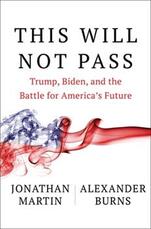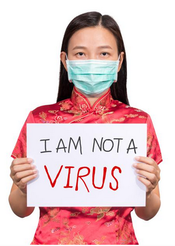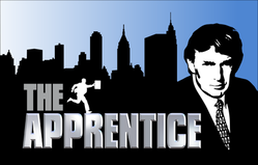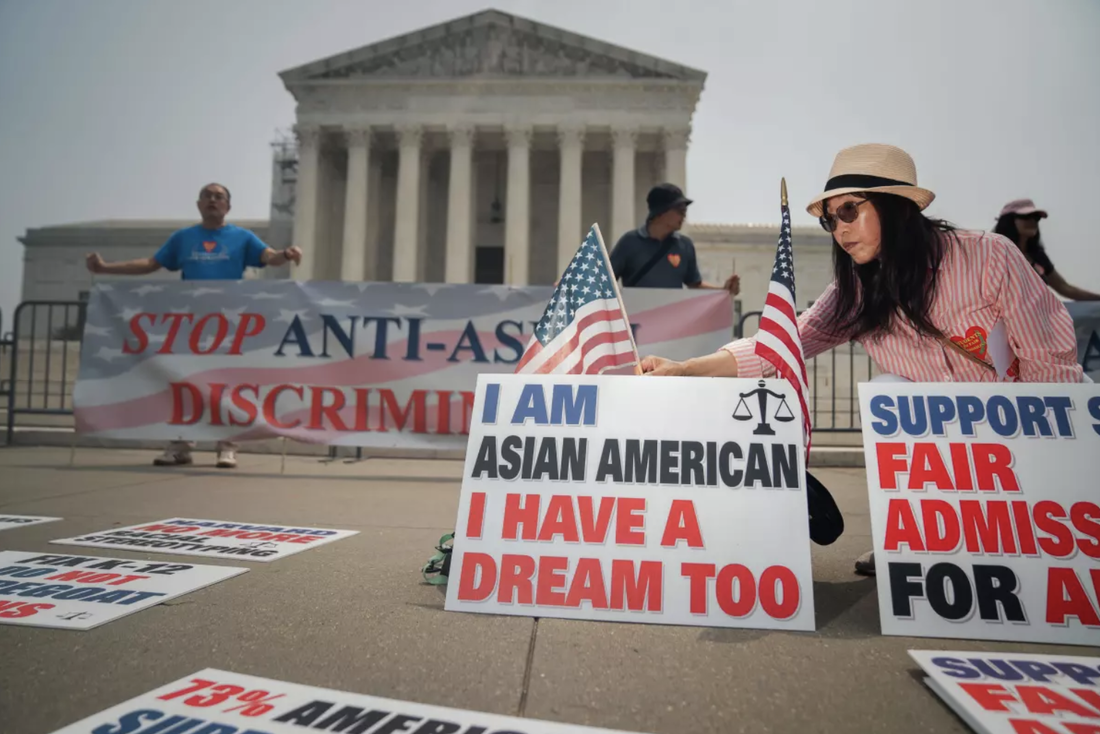|
With one more week to go this month of June, the entire nation is waiting with bated breath on the Supreme Court's ruling concerning Affirmative Action in two cases against Harvard and the University of North Carolina. This ruling is probably the most consequential of the Supreme Court affecting Asian Americans in decades. SOME HISTORY Since the 1960's, Affirmative Action programs had given preferences, additional points and even set aside quotas to increase the admission of under-represented minority groups into elite colleges and universities. These groups were mainly African American, Hispanic and Native American. The two main arguments for Affirmative Action are (1) to correct the historic and systemic discrimination against these minorities in the past history of the US and (2) that Affirmative Action programs are necessary to provide a wide and diverse study body essential for the learning environment of a college in the modern world. Opponents argue that race-based admissions is discrimination based on race, pure and simple and a violation of the equal protection clause of the Fourteenth Amendment. Chief Justice John Roberts said in 2007, "The way to stop discrimination on the basis of race is to stop discriminating on the basis of race.” Over the decades, Affirmation Action has faced increasing challenges at the high court and most agree this recent challenge will be its greatest if not its total defeat. The first challenge, however, was back in 1978 with the Bakke case. I remember writing a paper on this subject in college. We called it back then the case of "reverse discrimination." An engineer named Allan Bakke had applied to the medical school at UC Davis and been rejected twice. He sued claiming that the Affirmative Action program at UC Davis discriminated against him as a white person by allowing minorities with lower test scores and qualifications in. The school had set aside 16 out of 100 seats for a separate admissions track for minorities. The court ruled that while race can be used in admissions, quotas cannot. Bakke was admitted to the medical school. Justice Lewis Powell wrote that diversity on a college campus was a "compelling state interest" and a goal which can and should be used in the admissions process but that using a quota system was going too far. But his argument in favor of Affirmative Action was based on diversity and not the social justice argument (#1 above). That became the rationale and argument in future cases. Furthermore, race should be used in conjunction with a broad set of other criteria to craft a diverse student body. In 2003, two cases involving the University of Michigan were decided by the high court. In Gratz v. Bollinger, Jennifer Gratz, a white applicant was rejected by the undergraduate school (the president at the time was Lee Bollinger). In the admissions process, the school automatically gave 20 points on a 120 point scale to African Americans, Hispanics and Native Americans. The court ruled against Michigan stating that the point system was too mechanical and against the spirit of Judge Powell's ruling in Bakke. In a second case, Grutter v. Bollinger, Barbara Grutter, a white applicant, had applied to the University of Michigan Law School and been rejected. In this case, the court sided with the school feeling that its admission process was more finely tuned and appropriate to achieve its goal. Nevertheless, writing for the majority, Justice Sandra Day O'Connor added a new wrinkle to the Affirmative Action debate:
ASIAN AMERICANS In recent years, Asian Americans have been at the forefront of efforts to undo Affirmative Action (see NY Times "Affirmative Action Battle has a New Focus: Asian-Americans"). High achieving Asian Americans argue that these programs unfairly disadvantage them. An oft-cited Princeton study is used to state that "students who identify as Asian must score 140 points higher on the SAT than whites and 450 points higher than Blacks to have the same chance of admission to private colleges" (see "This is why Asian Americans are anxious about checking boxes in college admissions"; but note a counter "Opinion: Affirmative action isn’t hurting Asian Americans"). This is often referred as the "Asian Tax." Indeed, the current cases against Harvard and UNC argue that their admissions policies discriminate not against whites but against Asian Americans. The Asian American community is divided over Affirmative Action. Many (including most of my colleagues) support it such as the group, Asian Americans Advancing Justice (AAJC). In a 2012 National Asian American Survey, three out of our Asian Americans supported Affirmative Action. "More than 160 Asian American groups filed briefs in support of UT’s affirmative-action program" (see the Atlantic's "Asian Americans and the Future of Affirmative Action"). Other Asian Americans, however, are opposed, such as the Asian American Coalition for Education (AACE). In 2015, a group of 64 Asian American organizations filed a joint complaint against Harvard and nine other universities to the Department of Education. The AACE, a coalition of 117 Asian American groups, filed a brief in support of the lawsuit of Abigail Fisher (who is white) against the University of Texas at Austin. The Supreme Court ruled in favor of the university in 2013. In the excellent and fascinating Atlantic article just cited, the author makes the brilliant observation that this divide among Asian Americans may be a generational thing. Those opposed to Affirmative Action are mostly foreign-born immigrants from China while those in favor are mostly American-born:
CONCLUSION The debate around Affirmative Action is a long and complicated one. After the killing of George Floyd in Minneapolis in 2020, no one can deny that America still has problems with race. At the same time, no one can deny either that Affirmative Action as it is currently practiced also has problems and does, I believe, discriminate against Asian Americans. A mediating and better approach is Affirmative Action based not on race but on socioeconomic factors. And here is my personal and only statement you can quote:
UPDATE: on June 29, 2023, the Supreme Court indeed struck down Affirmative Action. See NYTimes article here.
0 Comments
 This past July I had the great pleasure of listening to this fascinating new book This Will Not Pass by NY Times journalists Jonathan Martin and Alexander Burns on audible.com. This easy-to-read book provides the inside scoop on the politics and tumult of the latter years of the Trump presidency, the 2020 election and the first year of the Biden administration. Based on extensive interviews and access to secret tapes, the authors really do paint "gripping in-the-room" details about such critical events as Trump's handling of the coronavirus pandemic, the 2020 presidential campaigns, the January 6th attack on the Capitol building and in particular "the growing tensions between Biden and his vice president, Kamala Harris, in the White House." This is a must read for any politico. Highly recommended. I was first attracted to this book when the authors were interviewed on CNN and they mentioned that Senator Tammy Duckworth of Illinois was at first considered the top candidate as Biden's vice presidential pick. Duckworth was born of a Thai Chinese mother and American father and grew up in Hawaii. She is fluent in Thai and Indonesian and is one of the few AAPI's in the Senate. I have a particular appreciation for her because she helped sponsor the bill in 2018 in Congress to award all Chinese Americans who served in WWII the Congressional Gold Medal of which my father was one of the recipients. See the www.caww2.org website for details and my blog on this honor of a lifetime. The senator was the ideal candidate for a vice president. Growing up in poverty and living off of food stamps, Duckworth joined the army and flew helicopters in Iraq. In 2004, hers was hit by an RPG and nearly killed her but she lost two legs. In 2018, she was noted as the first senator to give birth while in office. There was only one problem: she was born in Thailand. Biden officials feared her eligibility would be attacked in a birther-style manner just as Trump had attacked Obama. Legally, such an allegation would not stand but Biden did not want to deal with the distraction such an issue might become in the middle of an intense presidential campaign. "Or so Biden told himself" as the authors end the story in the book (p. 65). And so, Tammy Duckworth was passed over for Kamala Harris. The Illinois senator appears in another interesting vignette in the book. In the early days of the now President Biden administration when he was selecting his cabinet officials …
The story continues in the book and it gets even worse. During a conference call with two of Biden's top aids, one of them,
This story and many others like it are a reminder that AAPI's for all their achievements in America remain underrepresented and under-served relative to their achievements. They remain "stuck." See Margaret Chin's Stuck: Why Asian Americans Don't Reach the Top of the Corporate Ladder (NYU Press, 2020). In a climate where "diversity and inclusion" is the mantra of the day, Asian Americans remain "invisible." Lord have mercy. *The NJ Society of Professional Journalists is holding a panel discussion this coming Thursday, October 20th at 7 pm: "Invisible Asian Americans: Are the Press and Police Ignoring New Jersey’s Fastest-Growing Minority?" at my own university William Paterson with my old friend Ti-Hua Chang as the moderator. Event is both in-person and broadcast online. Check it out on this link. I'll be there.
 I don't know if anyone has coined the phrase "The Silent Minority" but I will. Asian Americans have traditionally been the Silent Minority in this country. Our parents told us to be quiet, don't cause trouble, keep your head down, suck it up. Compliance and conformity are part of our inherited culture. There's an expression in our first generation community which explains why: "The nail that sticks out the most gets hit on the head first." But in light of the year-long physical and verbal attacks on Asian Americans as the "China virus" and "Kung Flu" and especially the deadly killing of eight people, six of whom are Asian women, in the Atlanta area two weeks ago on March 16th, the Silent Minority must no longer be silent. It is gratifying to hear from almost every AA and AAPI group I know issue their statement of horror, protest and denunciation. You can read them all here:
It is also encouraging and a step forward to hear President Biden directly and publicly address the anti-Asian hate issue in Atlanta the Friday following the Asian spa shootings. As a Chinese and Asian American born and raised in this country, I find it shocking that these anti-Asian attacks are happening; I thought we were past this. I grew up in Brooklyn with my three brothers and three sisters where racial discrimination and verbal assaults were a regular experience. Sometimes, it would get physical. My older brother Peter would get into fist fights. When I was about twelve, some punk through rice in my face and we got into a scuffle. Trying to get up from the ground and get him off me, my right arm slipped behind my back and I dislocated my elbow. It has never been perfectly straight since. Then, in the many years that followed most everything was fine. I don't ever recall hearing the work "chink" again. Perhaps, the discrimination just went underground. But last year in late March, at the beginning of the pandemic, my wife came home one day from the supermarket very upset. She's the traditional "don't make trouble" type of Chinese person but even she sent out an email to her relatives with subject line: "Grocery Shopping - bad experience!." (She doesn't have a Facebook account.) I won't get into the details but let us just say that she experienced two notable anti-Asian incidents at a major supermarket chain here in northern NJ! I believe the change in climate is complex and complicated by (1) the rise of China as a major economic and political rival to the United States, (2) the anti-Chinese rhetoric played up by the previous Trump administration and (3) anti-Chinese rhetoric amplified by certain propaganda outlets on social media. Regardless, it is no longer good enough "to be quiet" anymore. We must speak up. In this country, only the "squeaky wheel gets the oil." For far too long, Asian Americans are the first to be overlooked and the last to be hired. Even President Biden has failed to appoint barely any AAPI's to his cabinet and high administration posts. See OCA Demands AAPI Inclusion from Biden Administration and White House Pledges Asian-American Focus After Democrats Threaten Nominees. But as a Christian minister, I don't believe we should answer anti-Asian hate with more hate, and anti-Asian rhetoric with more rhetoric and anti-Asian violence with more violence. I just watched today a wonderful Virtual Talk with Larissa Lam and Baldwin Chiu on AAPI Violence and Identity sponsored by the Crystal Bridges Museum of Art. Larissa quoted Will Smith, the Fresh Prince of Bel Air, who said that when it comes to racial issues "Most people are ignorant not evil." And so, when we speak up, we speak up to educate not to antagonize or threaten. Education Lesson #1: Asian Americans are Americans not foreigners. Education Lesson #2: Asian Americans have nothing to do with the coronavirus. The Asian American Christian Collaborative has called for a National Rally for AAPI Lives this Sunday, Palm Sunday, March 28th. I will rally with many others this Sunday in New York City's Union Square Park at 4 pm. I hope you will join us. It is time to be "silent no more."  Revised 10/24/2020 I actually met Donald Trump years ago when he was the host of the hit reality TV show The Apprentice. There was an open casting call for contestants to show up at his downtown office in Manhattan. Being free at the time and a fan of the show, I decided to give it a try. I took public transportation from NJ to lower Manhattan on a weekday only to discover a long line around the block. Nevertheless, I waited patiently with my briefcase and some reading material to keep me occupied. As I got closer to the lobby door, there was some commotion in the front of the line. There was Donald Trump with a small entourage greeting the would-be contestants waiting on line and he was walking towards me. Quickly, I opened my briefcase and whipped out a copy of his book The Art of the Deal and flashed it in front of him. He stopped, shook my hand and said "Good Book" and moved on. I was so shocked that he even noticed me that I didn't think to get his autograph. As I shook his hand, the thought occurred to me "Man, this guy's got the softest and fluffiest hands I've ever shaken. He probably never worked a day of hard labor in his entire life." I never dreamed that someday he would be the president of the United States. Since that brief encounter, I've always liked Donald Trump and tried to give him the benefit of the doubt but I write today as a fellow citizen and as a Christian to my fellow Christians that he must be defeated on Nov. 3rd. He cannot be re-elected to a second term of office. I hesitate to write this blog as I rarely go public on my political views but the stakes are so high and the choice is so clear that I cannot stand by and say nothing. Christians often quote Edmund Burke's saying “The only thing necessary for the triumph of evil is for good men to do nothing.” I will not stand by and do nothing. (See also Connie Chung's appeal.) I can understand why people in general and Christians in particular voted for Trump in 2016. Back then, the political system gave us an impossible choice. On the left, a Hillary Clinton with the second highest unfavorability rating in polling history (Donald Trump had the highest). Even when I taught at a Presbyterian seminary in South Carolina back in 1998, just the mention of Hillary's name would send a chill up many a spine. I was hoping that as president, Donald Trump would moderate and become more presidential. But he only became worse. I can understand why Christians voted for Trump in 2016 but not this time in 2020. Back when Bill Clinton was impeached, evangelicals were saying "character counts." What about now? Well, character still counts and because of his lack thereof, Donald Trump cannot be trusted with the reins of government; he must be defeated. But evangelicals say "He fights for us and our conservative causes." Yes, but there are plenty of other conservatives and Republicans who can do the job. We don't need Trump. Christians often quote Augustine, "In essentials, unity; in non-essentials, liberty; in all things, charity." Integrity, decency and character in our president is an "essential" regardless of your party affiliation. Worse comes to worse, hold your nose and vote Democrat this year and then Republican in 2024. I happen to be preaching a series on the Ten Commandments. It occurred to me that I think Donald Trump has broken almost everyone of them. "You shall have no other gods"; business and ratings are his gods. "You shall have no graven images"; note Trump Tower, Trump University, Trump Steaks, etc. "Remember the Sabbath"; Mary Trump wrote in her book that when a relative heard that evangelicals like Jerry Falwell, Jr. were supporting Trump, she said 'What's wrong with them? Donald never goes to church' (Kindle Location 150, my paraphrase). "You shall not commit adultery"; cf. Stormy Daniels. "You shall not steal"; Trump has filed for bankruptcy six times and paid no taxes in ten of fifteen years prior to his presidency. "You shall not bear false witness"; by August, he has made 22,247 false or misleading claims. "You shall not covet"; I'll let you be the judge of that. It is not as if I'm the only evangelical opposing Trump. The premier evangelical magazine Christianity Today came out with a editorial back in December "Trump Should Be Removed from Office." Recently, thirty evangelicals contributed to a new book The Spiritual Danger of Donald Trump. On a different note, prominent evangelical author and pastor Tim Keller warns of the danger of evangelical party partisanship:
Trump's biggest failure however is in his handling of the corona virus pandemic. This is unforgivable. To date, South Korea has had 457 deaths, Hong Kong 105, Taiwan 7 and the US 229,986. Our president cannot even promote something as simple and easy as wearing a mask. I still have a love/hate relationship with Donald Trump. Sometimes, I like him; sometimes I hate him. He has many gifts. He communicates well (I love the way he moves his hands when he says "One day, the virus will just go away."). He is a master of the media. I've heard he's even quite charming in person. When I saw his reaction upon hearing of the death of Ruth Bader Ginsburg, he seemed genuinely saddened. I'd like to give him the benefit of the doubt that given the life-and-death pressures facing him, he chose the side he thought would help him most. Unfortunately, he chose the dark side. And for that reason, he cannot be our president. He must be defeated. If you are a supporter of President Trump, I hope you will understand my position and forgive me. I hope someday to shake his hand again but in humbler circumstances. |
AuthorMilton's observations on life, faith and the contemporary. Archives
March 2024
Categories
|

 RSS Feed
RSS Feed